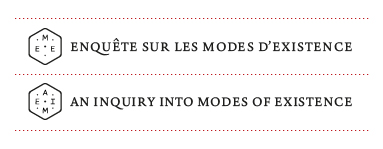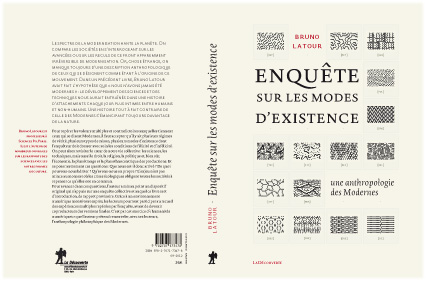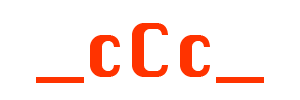Modes of Existence
Cherchez la technique, trouvez le truc
In his new project, An inquiry into modes of existence, Anthropology of the Moderns (AIME), Bruno Latour brings together the results of a twenty five-year inquiry. AIME is the extension of the question posed negatively in the 1991, with publication We have never been modern: if we have never been modern, what have we been?

In order to answer such questions, an innovative research protocol has been developed. It is very different from the Actor-Network Theory. The scope is no longer following the networks to redefine the social but understanding the different types of practices providing the social with a specific form. The different possible forms have been dubbed modes of existence. In this sense a mode of existence accounts for the many different experiences we encounter with law, science, politics, art, religion and so on.
By the means of empirical philosophy and an open collective inquiry, the project is aimed at portraying the modes and at describing their interactions: for example, when Bach’s music was labeled too artful for serving religious purposes, which esthetic judgments (the mode called [FIC]tion) were colliding with the religious conceptions (the mode called [REL]igion)? When Ernst Haeckel’s scientific community contested his drawings, which artistic and scientific (the mode named [REF]erences) criteria were conflicting? By collecting the empirical traces and evidences of these conflicts, the project has the ambition to create a space for a possible negotiation between them.

So far the project has identified fifteen modes of existence, but it is clear that such an undertaking has no chance of succeeding if pursued by one solitary author. The only way is to provide a set up for a collaborative work for empirical traces collection and emendation. In this sense the collaborative nature of the project is firstly aimed at knowing if the values we have identified correspond, or not, to commons’ experiences and if it is not—which is very likely—how we can change it, and on the basis of what research data. Roughly we call research data any document pointing out where two modes clash. The AIME’s team has collected many of these clashes. Part of these data have been borrowed from contexts external to the project and repurposed. Other contributions will be produced asking photographers, video-makers and artists and, in this workshop, designers to capture through their specific savoir-faire the subtle nuances of some of the modal conflicts. Here lies the collective and collaborative nature of AIME.
Every time somebody concerned with the project, the so called we call co-inquirer, will present an experience (by way of a text, a film, a radio program, an image), then is data. In this sense the project is conceived as a laboratory meant to provide the co-inquirer with a space where to conduct experiments, by using these data, in building scenographies of philosophical arguments.
During the CoCreationCamp we will try to make a live experience of this philosophical and collective laboratory. We choose a particular mode of existence called [TEC]hnique. This is the one where we foresee that most of the design and designer experiences fall into. We will propose a first set of data about the essence of a technique as the mediation of the relations between human and non-human being.
We will use as trigger a mixture of visual objects:
- some Gaston Lagaffe’s comic strip;
- some pictures of the Honda’s Asimo robot;
- some excerpts from Thomas Thwaites’ book “The Toaster Project” and from “I, Pencil” an essay by Leonard Read.
During the Workshop the participants will be asked:
- to find similar experiences in their life and in their daily professional activities;
- to share them among the other participants;
- to collectively try to document them in a sort of quick-and-dirty scenarization.
At the end of the workshop a short discussion about this experience of collective and philosophical reflexion based on empirical and visual evidences will take place.
More on http://www.modesofexistence.org
